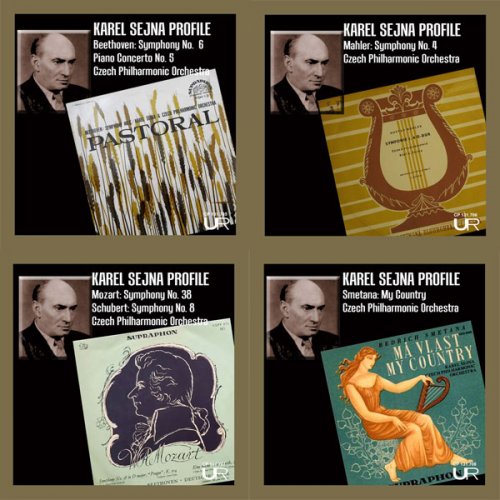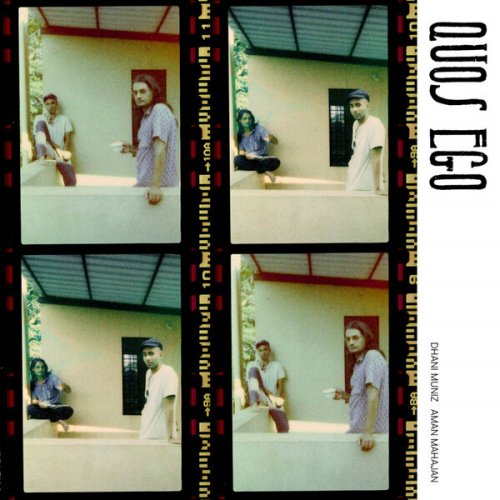Karel Sejna and Czech Philharmonic Orchestra - SEJNA PROFILE, VOL. I - IV (Remastered 2024) (2024)

Artist: Karel Sejna, Czech Philharmonic Orchestra, Maria Tauberova, Frantisek Rauch
Title: SEJNA PROFILE, VOL. I - IV (Remastered 2024)
Year Of Release: 2024
Label: Urania Records
Genre: Classical
Quality: FLAC (tracks)
Total Time: 4:05:34
Total Size: 672 MB
WebSite: Album Preview
Tracklist:Title: SEJNA PROFILE, VOL. I - IV (Remastered 2024)
Year Of Release: 2024
Label: Urania Records
Genre: Classical
Quality: FLAC (tracks)
Total Time: 4:05:34
Total Size: 672 MB
WebSite: Album Preview
VOL. I
1. Symphony No. 6 in F Major, Op, 68 'Pastorale' I. Allegro ma non troppo (08:53)
2. Symphony No. 6 in F Major, Op, 68 'Pastorale' II. Andante molto mosso (11:43)
3. Symphony No. 6 in F Major, Op, 68 'Pastorale' III. Allegro (05:31)
4. Symphony No. 6 in F Major, Op, 68 'Pastorale' IV. Allegro (03:20)
5. Symphony No. 6 in F Major, Op, 68 'Pastorale' V. Allegretto (09:03)
6. Piano Concerto No. 5 in E flat major, 'Emperor' I. Allegro (18:54)
7. Piano Concerto No. 5 in E flat major, 'Emperor' II. Adagio un poco mosso (07:08)
8. Piano Concerto No. 5 in E flat major, 'Emperor' III. Rondo Allegro (10:14)
VOL. II
1. Symphony No. 4 in G Major I. Bedächtig, Nicht eilen, recht gemächlich (15:35)
2. Symphony No. 4 in G Major II. Im gemächlicher Bewegung (09:45)
3. Symphony No. 4 in G Major III. Ruhevoll (17:44)
4. Symphony No. 4 in G Major IV. Sehr behaglich Das himmlische Leben (08:45)
VOL. III
1. Symphony No. 38 in D major KV 504 'Prager' I. Adagio. Allegro (10:17)
2. Symphony No. 38 in D major KV 504 'Prager' II. Andante (07:56)
3. Symphony No. 38 in D major KV 504 'Prager' III. Presto (04:01)
4. Symphony No. 8 in B minor D. 759 'Unfinished' I. Allegro moderato (11:31)
5. Symphony No. 8 in B minor D. 759 'Unfinished' II. Andante con moto (11:45)
VOL. IV
1. Má Vlast I. Vyšehrad (14:21)
2. Má Vlast II. Vltava (11:29)
3. Má Vlast III. Šárka (09:25)
4. Má Vlast IV. Z českých luhů a hájů (11:43)
5. Má Vlast V. Tábor (12:23)
6. Má Vlast VI. Blaník (13:58)
Karel Šejna (1 November 1896, Zálezly – 17 December 1982, Prague) was a Czech double bassist and conductor, the principal conductor of the Czech Philharmonic Orchestra in 1950.
Šejna's musical studies were at the Prague Conservatory under Professor Černý (double-bass, 1914–20) and later with K. B. Jirák (composition). As a young man he gave several concerts in Egypt, and on his return to Czechoslovakia in 1921 he was appointed the first double-bassist of the Czech Philharmonic Orchestra, and shortly after (on 25 July 1922) also conducted the orchestra at a concert in Žofín Palace in Prague. Some compositions including a song-cycle and a string quartet date from this time.
He began to conduct on recommendation of the principal conductor of the Czech Philharmonic of that time, Václav Talich. Talich gradually entrusted him with more difficult tasks, and later recommended him to the post of conductor of the Czechoslovak Railway Workers Symphony Orchestra (1925–1936). From 1926 to 1938 Šejna worked also as choirmaster of the Hlahol Choir in Vinohrady, travelling with them to Yugoslavia and Vienna. In 1938 he was hired as the conductor of the Czech Philharmonic Orchestra. He conducted hundreds of concerts, notably romantic repertoire, but also the music of 20th century. (He performed the Prague premiere of Janáček's Glagolitic Mass). In 1937-38 Šejna was engaged as guest conductor of the Budapest Philharmonic Orchestra.
After the emigration of Rafael Kubelík, the post-war chief of the orchestra, Šejna was for a short time appointed as the principal conductor of the Czech Philharmonic, touring with the orchestra to East and West Germany and to the UK. He was a noted interpreter of the music of Hector Berlioz, César Franck, Richard Strauss and especially of Gustav Mahler. His last concert with the Czech Philharmonic took place on 11 February 1972, with Mahler's Symphony No. 4.
Šejna's musical studies were at the Prague Conservatory under Professor Černý (double-bass, 1914–20) and later with K. B. Jirák (composition). As a young man he gave several concerts in Egypt, and on his return to Czechoslovakia in 1921 he was appointed the first double-bassist of the Czech Philharmonic Orchestra, and shortly after (on 25 July 1922) also conducted the orchestra at a concert in Žofín Palace in Prague. Some compositions including a song-cycle and a string quartet date from this time.
He began to conduct on recommendation of the principal conductor of the Czech Philharmonic of that time, Václav Talich. Talich gradually entrusted him with more difficult tasks, and later recommended him to the post of conductor of the Czechoslovak Railway Workers Symphony Orchestra (1925–1936). From 1926 to 1938 Šejna worked also as choirmaster of the Hlahol Choir in Vinohrady, travelling with them to Yugoslavia and Vienna. In 1938 he was hired as the conductor of the Czech Philharmonic Orchestra. He conducted hundreds of concerts, notably romantic repertoire, but also the music of 20th century. (He performed the Prague premiere of Janáček's Glagolitic Mass). In 1937-38 Šejna was engaged as guest conductor of the Budapest Philharmonic Orchestra.
After the emigration of Rafael Kubelík, the post-war chief of the orchestra, Šejna was for a short time appointed as the principal conductor of the Czech Philharmonic, touring with the orchestra to East and West Germany and to the UK. He was a noted interpreter of the music of Hector Berlioz, César Franck, Richard Strauss and especially of Gustav Mahler. His last concert with the Czech Philharmonic took place on 11 February 1972, with Mahler's Symphony No. 4.
![Magda Mayas' Filamental - Murmur (2026) [Hi-Res] Magda Mayas' Filamental - Murmur (2026) [Hi-Res]](https://www.dibpic.com/uploads/posts/2026-02/1771663724_i3cjtptz4ae2l_600.jpg)
![Art Pepper - Everything Happens To Me: 1959 - Live At The Cellar (2026) [Hi-Res] Art Pepper - Everything Happens To Me: 1959 - Live At The Cellar (2026) [Hi-Res]](https://www.dibpic.com/uploads/posts/2026-02/1771405170_fcwg7jmt6mou1_600.jpg)


![Ragini Trio - 3 (2026) [Hi-Res] Ragini Trio - 3 (2026) [Hi-Res]](https://img.israbox.com/img/2026-02/19/uoki2dxo3dfz215xa2kz53gcp.jpg)

![Dave Slonaker Big Band - Shifty Paradigms (2026) [Hi-Res] Dave Slonaker Big Band - Shifty Paradigms (2026) [Hi-Res]](https://www.dibpic.com/uploads/posts/2026-02/1771506144_eu5h6bbhmvwxe_600.jpg)

